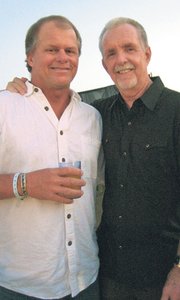Focus at Surf Summit on Authenticity, Environment
SAN JOSE DEL CABO, Mexico—Surfwear makers and industry leaders gathered south of the border for the ninth-annual Surf Summit to pow-wow about getting back to their core roots and preserve the environment that makes their lifestyle possible.
While catering to the “core” surf customer has always been key for surf manufacturers, in recent years, many companies have focused on growing the surf business, taking advantage of the popularity of surfing and the overall surf lifestyle.
Competition from mall-based chains that are successfully mimicking the surf image is pushing the industry to emphasize the importance of authenticity. Retailers, from small independents to large chains like Pacific Sunwear, are feeling squeezed by the likes of Abercrombie & Fitch Co.’s Hollister Co., which sells surfwear by the boatload but lacks a true surf pedigree.
“This is an industry that has very limited distribution avenues compared to all other apparel business,” said Dick Baker, president of Ocean Pacific Apparel Corp. and president of the Surf Industry Manufacturers Association, which organizes the summit.
Protecting those distribution channels and educating consumers on the importance of authenticity in surf brands were major themes for companies offering the genuine article.
Surf Summit drew its biggest group yet: 410 representatives from manufacturers, retailers, investment banks, board builders and other industry groups. Industry bigwigs, from Quiksilver’s Bob McKnight to Hurley’s Bob Hurley to O’Neill’s Kelly Gibson, made the trek to the Royal Solaris Los Cabos resort for the summit’s May 18–21 run.
“We were stoked to have a great showing from the new and smaller brands, showing that Surf Summit is a valuable event for all our members,” Baker said.
This year’s group, more than any other, was the most engaged with the summit’s conferences, opting for a seat in the conference room rather than a chair by the pool, said Sean Smith, SIMA’s executive director.
Author and environmental activist Robert F. Kennedy Jr. delivered a rousing speech encouraging surfers to flex their political muscle to help keep oceans and rivers clean for the sake of their children and their livelihood.
Venture capitalist Guy Kawasaki returned to Surf Summit for a second year to speak to retailers and manufacturers about the art of evangelizing product. Using examples, from Quiksilver’s watch, which provides tide information, to Reef’s sandal/bottle opener, he urged attendees to find ways to make consumers passionate about the surf industry.
Despite the brainstorming and networking, fun was still a major part of the agenda. Oceanside, Calif.–based Transworld Surf Business hosted a women’s surf clinic and the notorious Cabo bar crawl.
“Anywhere you can surf great waves with major accounts and then drink tequila with key industry and media persons at night is a place worth celebrating,” said Jesse Faen, chief executive officer of Insight USA, a nominee for SIMA’s Image Awards’ Breakthrough Brand of the Year.
Retailers Strive to Be the Real Deal
PacSun chief Seth Johnson spoke to attendees about his company’s focus on recapturing its core appeal.
In recent years, the chain has grown to more than 1,100 stores with $1.4 billion in sales, and has been perceived more as a mall chain than a core chain.
“We’re trying to think about the business more holistically.
Before, it was a more downscale retail environment. Now, there is more competition and it has raised the bar,” Johnson said.
New Albany, Ohio–based Hollister, which Johnson calls “a brand created from nothing,” has experienced excellent sales in its 300 stores and is eating into PacSun’s market share. “It’s a great execution of a brand—good apparel, hip store design and good visual presentation,” he said.
In response, PacSun is working on improving its product and in-store experience. The company is experimenting with new retail environments to lure core customers and girls.
Girls who haven’t been drawn to the store’s round racks will be enticed with more airy retail spaces and well-styled mannequins.
PacSun’s ad campaigns, which lacked edge, have been revamped to appeal to kids living or loving the surf lifestyle, Johnson said. And while the chain probably won’t leave the mall, PacSun will experiment with stores in resorts with limited space and product.
On the other side of the spectrum, Tom Campion, head of the Everett, Wash.–based core chain Zumiez, showed attendees how his stores stay core and grass-roots driven despite marked expansion.
Selling both hard and soft goods in 174 stores in 19 states (not including the new 19 stores from the acquisition in May of Texasbased Fast Forward), Zumiez plans to open 42 more stores this year—all without losing its street credibility.
The secret, Campion said, is in the kids who work the shops. Finding and grooming a sales team that embodies the lifestyle and can sell the product from personal experience is key to being perceived by core consumers as the place to shop and congregate. The average age of a Zumiez store manager is 23, Campion said.
The retailer rewards excellent sales with must-attend raging parties. Competition against each other and oneself is a part of life at Zumiez, where bragging rights on the sales floor are as big a deal as on the ramp.
Zumiez’s work-hard, play-harder, culture paid off in 2005 when the 28-year-old retailer went public.
Image Awards
On the final night of the summit, SIMA hosted the awards ceremony for its Image Awards. Volcom won for Ad Campaign of the Year; Quiksilver’s “Deep” tide watch took home the honor for Product Innovation of the Year; Electric Visual won the Breakthrough Brand of the Year award, after being nominated for a third time; Orange County, Calif.–based Jack’s Surfboards won for Retailer of the Year; Surftech was honored as Board Builder of the Year; Roxy won for Women’s Brand of the Year; Billabongwas named Men’s Brand of the Year and Volcom accepted the award for Manufacturer of the Year.























